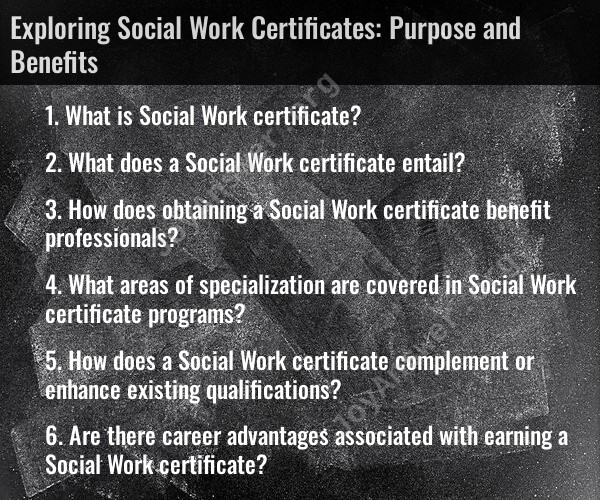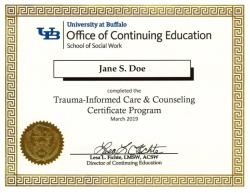What is Social Work certificate?
A social work certificate is a credential that individuals in the field of social work can earn to demonstrate specialized knowledge and skills in a particular area of practice. These certificates are typically designed for social workers who want to enhance their expertise in specific domains or populations within the broader field of social work. While a bachelor's or master's degree in social work is the foundational qualification for entry into the profession, certificates provide an avenue for ongoing professional development and specialization.
Here are some common purposes and benefits of social work certificates:
Specialization: Social work certificates allow professionals to specialize in a particular area of practice. Specializations may include clinical social work, child welfare, gerontology, healthcare social work, school social work, substance abuse counseling, and more. These certificates help social workers gain in-depth knowledge and skills in their chosen specialization.
Career Advancement: Obtaining a social work certificate can enhance career opportunities and advancement. Employers often value specialized expertise, and having a certificate in a specific area can make social workers more competitive in the job market and open up new career paths.
Skill Enhancement: Certificates provide an opportunity for social workers to enhance their skills in a targeted and focused manner. This can include developing clinical skills, intervention techniques, assessment methods, and other competencies relevant to the chosen specialization.
Meeting Licensing Requirements: In some jurisdictions, social workers may need to obtain additional certifications to meet licensing or regulatory requirements. For example, a clinical social work certificate may be required for those seeking licensure as a clinical social worker.
Professional Recognition: Social work certificates can serve as a form of professional recognition within a specific area of practice. They demonstrate a commitment to ongoing learning and professional development, indicating to employers and colleagues that the social worker has acquired specialized knowledge and skills.
Networking Opportunities: Certificate programs often provide opportunities for networking with other professionals in the same specialization. This networking can be valuable for sharing best practices, staying informed about current trends, and building a supportive professional community.
Continuing Education: Many social work certificates involve completing a specified number of continuing education hours. This helps social workers stay current with developments in their field, maintain their licensure, and meet the ongoing educational requirements of professional organizations.
Flexibility: Social work certificates are often designed to be flexible, allowing professionals to pursue them while continuing to work. Certificate programs may be offered online or through part-time formats to accommodate the schedules of working social workers.
It's important to note that the availability of social work certificates and their specific requirements can vary by region and institution. Social workers interested in pursuing a certificate should research programs that align with their career goals and consider how the certificate complements their existing education and experience in social work.
Unveiling the Value of Social Work Certificates:
What does a Social Work certificate entail?
Social work certificates are intensive academic programs offering focused knowledge and skills in specific areas of the field. They typically involve coursework, culminating in exams or projects, and can range from short-term (few months) to longer-term (one year or more) programs. Some programs are geared towards professionals already working in the field, while others cater to individuals seeking entry-level positions.
2. Benefits of obtaining a Social Work certificate for professionals:
- Deepen Expertise: Acquire specialized knowledge and skills in areas like child welfare, mental health, gerontology, or substance abuse counseling.
- Career Advancement: Enhance your qualifications and make yourself more competitive for specialized positions within the social work field.
- Expand Network: Connect with other professionals in your area of interest through program coursework and networking opportunities.
- Boost Credibility: Demonstrate your commitment to continuous learning and professional development to employers and clients.
- Fill Knowledge Gaps: Bridge gaps in your existing education or experience to become more well-rounded in your practice.
3. Areas of specialization covered in Social Work certificate programs:
The available specializations are vast and diverse, mirroring the many facets of social work practice. Some popular areas include:
- Child Welfare: Child protection, foster care, family reunification, and adoption.
- Mental Health: Trauma-informed care, addiction counseling, cognitive behavioral therapy, and clinical social work.
- Gerontology: Aging services, dementia care, end-of-life care, and social isolation in older adults.
- Disability Services: Advocacy for individuals with disabilities, accessibility resources, and community integration.
- Leadership and Management: Supervision skills, program development, fundraising, and policy analysis.
- Substance Abuse Counseling: Addiction treatment, prevention programs, and harm reduction strategies.
4. How a Social Work certificate complements or enhances existing qualifications:
- Bachelor's Degree: If you hold a BSW, a certificate can expand your expertise or prepare you for specialized roles requiring postgraduate education.
- Master's Degree: For MSW graduates, a certificate can deepen your knowledge in a specific area or provide skills complementary to your degree focus.
- Other Fields: Professionals transitioning to social work can gain foundational knowledge and practical skills through a certificate program.
5. Career advantages associated with earning a Social Work certificate:
- Increased Job Opportunities: A targeted certificate can make you stand out to employers seeking specific expertise.
- Higher Earning Potential: Specialized skills can command higher salaries in certain positions.
- Greater Job Satisfaction: Deeper knowledge and enhanced competence can lead to increased fulfillment in your chosen role.
- Improved Client Outcomes: Specialized skills allow you to provide more effective support and services to clients in specific areas.
Remember, the value of a Social Work certificate depends on your individual career goals and context. Carefully consider your needs and research programs that align with your desired learning outcomes and professional aspirations.










